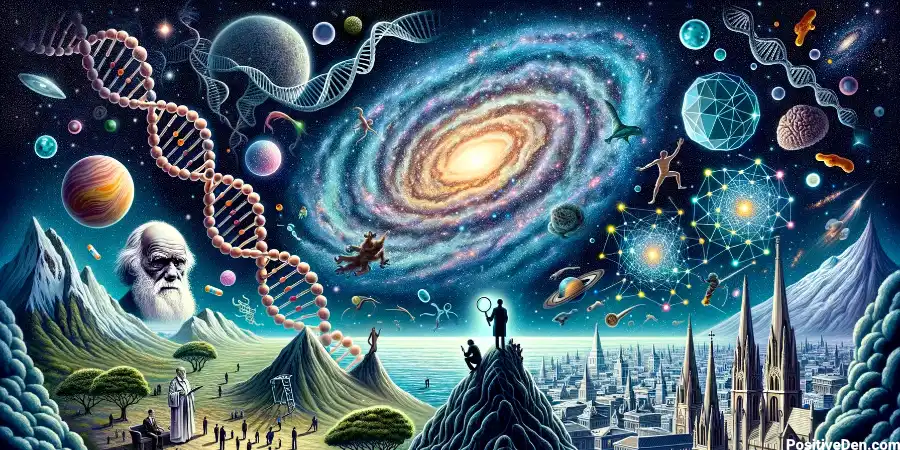When people ask about the purpose of life, they’re often searching for deeper meaning or comfort. It’s a question we all think about, especially during big life events or tough times. People have been asking this question for a very long time, and everyone might have a different answer. Some answers come from personal experiences, some from what we’ve learned from others, and some from our own beliefs. There’s no single right answer, but many different thoughts and feelings that people have about it.
You’re not alone in your curiosity. It’s a sign of intelligence and depth to reflect on such questions.
We’ve dedicated a significant amount of time and effort into our research to come up with these answers. Our commitment is to remain impartial, without taking sides or showing bias. We aim to present all the answers just as they are, allowing you, our valued reader, to form your own understanding and conclusions.
Here are a few common answers that might make sense to different people.
1. The Philosophical Answer

Throughout history, these philosophical perspectives have guided and inspired countless individuals in their search for life’s meaning. And while the question remains open-ended, the insights from these thinkers offer valuable waypoints on the path to understanding.
Seeking Happiness
Aristotle, an ancient Greek philosopher, was one of the thinkers who believed life is all about finding a profound kind of happiness. He termed it “eudaimonia,” a happiness that isn’t just a fleeting moment of joy, like when you bite into your favorite snack, but a lasting contentment that comes from living a good life and making the right choices.
Learning and Knowing
Socrates, another prominent figure from ancient Greece, was of the opinion that life’s essence is about continuous learning and understanding. For him, always being curious, asking questions, and seeking answers is what gives life its purpose. Think of it as being on an exciting quest where every new piece of knowledge is a precious gem to be treasured.
Making Your Own Meaning
Then there are existentialist philosophers like Jean-Paul Sartre and Friedrich Nietzsche. They proposed a slightly different take: there isn’t a predefined purpose for everyone. Instead, each individual crafts their own unique path and determines what life means to them. It’s akin to setting out on a personal journey and choosing the adventures that resonate most with your inner self.
2. The Spiritual or Religious Answer

Religion and spirituality have long provided answers to life’s most profound questions. For countless individuals, purpose and meaning are deeply intertwined with their beliefs. Here’s a look at how some of the world’s major religions approach the question of life’s purpose:
Christianity
For Christians, life’s purpose is often viewed as serving and honoring God. Following the teachings of Jesus Christ, they believe in loving one another, living righteously, and striving for eternal life in heaven. Acts of charity, faith, and spreading the Gospel are seen as fulfilling God’s purpose.
Islam
Muslims believe that life’s primary purpose is to worship Allah (God) and to live according to the teachings of the Quran. Acts of charity, prayer, fasting, and making a pilgrimage to Mecca are among the pillars that guide a Muslim’s life. They also believe in living a life of righteousness and seeking God’s mercy and forgiveness.
Hinduism
In Hinduism, life’s purpose is multifaceted. It encompasses Dharma (duty/righteousness), Artha (prosperity/wealth), Kama (desires/passions), and Moksha (liberation from the cycle of rebirth). The ultimate goal for many Hindus is achieving Moksha, which is spiritual enlightenment and liberation from the cycle of reincarnation.
Buddhism
Buddhists believe in the Four Noble Truths, which diagnose human suffering and provide a path to its cessation. The ultimate goal in Buddhism is to achieve Nirvana, a state of enlightenment that breaks the cycle of birth, death, and rebirth. By following the Eightfold Path, Buddhists seek to understand the nature of existence and find inner peace.
Judaism
For Jews, life’s purpose is deeply rooted in the covenant with God. Living by the commandments of the Torah and pursuing justice and righteousness in the world are central tenets. Acts of charity, community, and study are also fundamental in living a life aligned with God’s will.
Sikhism
Sikhs believe in living a life that balances both spiritual and worldly responsibilities. The teachings of the Guru Granth Sahib emphasize the importance of honest work, sharing with others, and remembering God. The ultimate aim is to merge one’s soul with the supreme soul, achieving spiritual enlightenment.
Taoism
Taoists believe in living in harmony with the Tao, which is a fundamental principle that is the source of all existence. Instead of striving against the natural order of things, Taoists believe in aligning with it, emphasizing balance, simplicity, and contentment.
Jainism
Jainism emphasizes non-violence and truth. Followers believe that every living being has a soul and that the purpose of life is to achieve liberation for the soul. Jains practice strict non-violence, honesty, and asceticism to purify the soul and achieve moksha, or liberation from the cycle of rebirth.
Bahá’í Faith
Followers of the Bahá’í faith believe that the purpose of life is to know and worship God, to acquire virtues, and to promote the oneness of humanity. They believe in the spiritual growth of the soul and that this growth continues in the afterlife.
Shinto
Shinto is the indigenous religion of Japan. It emphasizes the bonds between humans and nature. Rituals and practices are designed to connect followers with the kami, or spiritual forces and beings. For Shintoists, life’s purpose is deeply tied to understanding and honoring these bonds with nature, ancestors, and deities.
Indigenous and Tribal Beliefs
Across the world, many indigenous and tribal groups have their spiritual beliefs rooted in nature, ancestors, and the land they inhabit. While these beliefs can vary widely, many emphasize living in harmony with nature, honoring the spirits of ancestors, and participating in communal rituals and ceremonies that strengthen the bonds of the community.
3. The Scientific Answer

Science offers a different lens through which to understand life’s purpose, often grounded in empirical evidence, observation, and theories that have stood up to rigorous testing.
Biological Perspective
From the standpoint of biology, life can be seen as a continuous cycle of growth, adaptation, and reproduction. Every living organism, from the tiniest bacteria to the largest mammals, shares a fundamental drive: to reproduce and pass on their genetic material to the next generation. Charles Darwin’s theory of evolution by natural selection suggests that those organisms best adapted to their environments are more likely to survive and reproduce. In this context, the purpose of life can be distilled down to two main objectives: survival and reproduction. This ensures the continuation and evolution of species over time.
Cosmological Perspective
When we look up at the vast expanse of the universe, it’s hard not to feel a sense of wonder. From the cosmological view, our existence is a result of a series of cosmic events that began with the Big Bang around 13.8 billion years ago. Scientists like Carl Sagan have posited that we, as conscious beings, are the universe’s way of understanding and knowing itself. In this sense, our very existence and quest for knowledge make us active participants in the universe’s unfolding story. We’re not just passive observers; we’re interconnected with the cosmos, seeking answers to its mysteries.
Neuroscientific Perspective
Our brains, with their intricate networks of neurons, play a crucial role in how we perceive our purpose. From a neuroscientific standpoint, our actions and decisions are influenced by a combination of our genes, experiences, and the complex interplay of neurotransmitters and neural pathways. Some scientists believe that our pursuit of purpose and meaning is a byproduct of evolutionary processes that favored social bonding, problem-solving, and forward-thinking, all of which contributed to our survival as a species.
Psychological Perspective
Psychology studies the human mind and behavior. From this viewpoint, one could argue that the purpose of life is to seek fulfillment, contentment, or self-actualization. Abraham Maslow, a renowned psychologist, proposed a hierarchy of needs, with self-actualization at the pinnacle. This state represents the realization of personal potential and self-fulfillment. For many, the journey towards understanding oneself and achieving mental well-being becomes a central purpose.
Sociological Perspective
Sociology looks at human behavior in the context of society. From a sociological standpoint, one’s purpose can be shaped by societal norms, roles, and expectations. Society often dictates benchmarks for success, happiness, and purpose, be it through milestones like education, career, or family. While these societal markers can provide a sense of purpose for some, they also lead others to question and redefine their own individual paths.
Environmental Perspective
From an environmental or ecological standpoint, all life forms have a role to play in the balance of ecosystems. Humans, with their unique cognitive abilities, have the responsibility and capability to steward and protect the environment. For some, the purpose of life is intrinsically tied to ensuring a sustainable, harmonious coexistence with nature.
Quantum Physics Perspective
Quantum physics looks at the really small stuff in the universe. By studying it, we end up asking big questions about how everything works and our role in it. Some people think that when we watch and try to learn about these tiny things, we might change how they behave. It’s like our questions and curiosity can shape a little part of the universe.
While science might not provide the philosophical or spiritual answers some seek, it offers a grounded, ever-evolving understanding of our place in the cosmos. The beauty of the scientific perspective is that it’s always expanding, always questioning, and continually pushing the boundaries of our knowledge.
4.The Personal Growth Answer

Life’s journey is all about progression, and there are three main areas where we focus: learning, growing, and becoming our best.
Learning
Every new day is a fresh opportunity to learn. Whether it’s picking up a new technique at work, listening to a friend’s unique perspective, or tackling a challenging puzzle, there’s always something to gain. With each sunrise, our mission is simple: stay curious, be open-minded, and embrace the lessons that come our way.
Growing Stronger
Life is full of surprises. Some days are sunny and full of joy, while others might be rainy with challenges. These challenges can be anything – a tough day at work, a disagreement with a friend, or unexpected changes. But here’s the thing about challenges: they teach us.
With every tough situation, we learn something new.
Maybe it’s patience, maybe it’s resilience, or maybe it’s understanding.
And as we face and overcome these challenges, we don’t just get through them, we grow from them. We become a bit stronger, a bit more prepared, and a bit wiser. So, every challenge, no matter how big or small, is a chance for us to grow and become the best version of ourselves.
Becoming Our Best
Every experience, every lesson, is a step toward becoming the best version of ourselves. We’re not chasing perfection but improvement. The goal is to look back at each day and know we gave it our all.
In short, as we navigate through life, our purpose is clear: continuously learn from our surroundings, grow stronger with each challenge, and always push towards being the best we can be.
5. The Relational Answer

Life is filled with people and the moments we share with them. From family and friends to strangers we meet, every interaction adds something to our journey.
Building Bonds
From our earliest memories, we start forming bonds. Be it with siblings, childhood friends, or classmates, these relationships shape our understanding of companionship and trust. As we grow, we meet more people – in schools, at work, in our communities. Each relationship, whether it lasts a lifetime or just a moment, teaches us something. Many people’s goal is simply to build and maintain the bonds with friends and family.
Being a parent
For some, one of life’s greatest purposes is raising children. It’s about guiding them, teaching values, and giving love. As they grow, children use these lessons to shape their paths. Also, the bond with our parents or guardians is a cornerstone in our lives. This foundational relationship instills in us values, traditions, and an understanding of unconditional love. As we grow and navigate life, the teachings and memories from these early years often serve as a compass, guiding our actions and decisions in various relationships.
Serving Others
For many, life’s true calling is to extend a hand to strangers, animals, or specific groups in need. These compassionate individuals often express their love and commitment through donations or by actively volunteering their time and resources. Their purpose is clear: to make a positive impact and spread kindness where it’s needed most.
Sharing Experiences
Life is also about the experiences we share. Celebrating a friend’s success, comforting them in their tough times, or just sharing a quiet moment watching a sunset. These shared moments are what memories are made of.
6. The Existential Answer

Life is a mystery. We all wonder about it. Why are we here? What’s the point? Some people believe that there’s a big plan or a reason for everything. But not everyone thinks this way.
No Set Meaning
Existential thinkers have a different take. They believe life doesn’t come with a ready-made purpose. Instead, it’s like an open book, and we’re the authors. This means life is what we make of it.
Finding Our Purpose
For some, this idea might sound a bit scary. But for others, it’s freeing. It means we’re in charge of our own destiny. We get to decide what’s important to us, what goals to chase, and what kind of life we want to live.
Creating Our Path
So, while life might not hand us a purpose on a silver platter, it gives us something even more valuable: the freedom to choose. Every decision, every action, and every dream is a step toward creating our own unique path.
In the end, whether life has a set purpose or not, what’s clear is that it’s up to us to make the most of it. We have the power to shape our journey, find our purpose, and create a life filled with meaning.
7. The Comforting Answer

Life is a vast, open-ended question, filled with wonder, hope, and sometimes, confusion. You don’t need to be scared or worried if you don’t have a purpose. While I may not hold a map with all the answers, I genuinely believe that each of us is here for a special reason. That within us lies a unique purpose waiting to be uncovered.
“I don’t have all the answers, but I believe each of us has a unique purpose. It’s a journey to discover it, and I’m here with you on that journey.”
This is a shared journey and we are all together!
Finding that purpose isn’t always a straightforward path. It’s a journey filled with moments of clarity, days of questioning, and times of reflection. But the beauty of this journey is that we’re not walking it alone. All the humans are in this together and learning from one another.
It’s okay to have doubts or feel lost sometimes. What’s important is to remember that you’re not alone in these feelings.
In essence, while the bigger question of life’s purpose might remain a mystery, the journey to discover it is a shared experience. It’s a path we walk together, supporting, comforting, and uplifting each other every step of the way.
What We Think is the Life’s Purpose?

You’ve heard lots of thoughts about “What’s the purpose of life?” Now, it’s our turn. We’re keeping it straightforward
We Believe Life is Meant to be Celebrated.
Life is full of ups and downs, but that doesn’t mean we can’t celebrate it in every form. Good days, bad days, moments of joy, and times of sorrow all mix together to make our unique life stories. Pain and struggles are not just troubles to be solved. They’re parts of our journey and they often bring important lessons with them. And even if we don’t always find a lesson, that’s perfectly okay. All parts of life, the happy and the sad, are worthy of being acknowledged and remembered.
We Believe Life is Meant to be Lived Without Regrets.
Choosing the best actions and making smart choices is what we all aim for, but sometimes things just don’t go as planned. And when they don’t, it’s important to remember that we can’t change the past. We have a limited amount of time on Earth, and spending it dwelling on regrets isn’t a great use of it. Death is a part of our journey that we’ll all meet eventually, so while we’re here, let’s focus on doing things, moving forward, and not getting stuck in the “what ifs” and “if onlys.”
We Believe in Being Good and Positive.
Let’s keep it real: being good and staying positive isn’t always easy, but it’s so worth it. Life throws all sorts of stuff our way – some good, some bad, and some that’s downright confusing. But holding onto a spirit of positivity and keeping a good, kind heart through all of it, that’s something special. It’s about lighting up our piece of the world with good deeds and encouraging words, even when things seem a bit dark. After all, a positive attitude and acts of goodness aren’t just for ourselves, they ripple out and touch the lives of others in ways we might never even realize. So let’s be the goodness we wish to see, sprinkling a bit of positivity wherever we go. Life’s a team sport, and every bit of kindness counts!
We Believe Life is Meant to be Lived, Not Theorized.
Okay, so here’s a bit of fun irony for you: we’re here writing all about life, even though we’re saying life is meant to be lived and not just talked about! But hey, no regrets, right? Sometimes, trying to piece together our thoughts and theories about life is part of living it. It’s part of trying to make sense of this wild ride, sharing thoughts, starting conversations, and maybe even seeing things from a new perspective. So, let’s keep living, keep doing, and every once in a while, pause to have a little chat about it – with a smile, of course.
Now It’s Your Turn!

We’ve laid out plenty of thoughts and ideas about life’s purpose. Now, we’re really curious about what you think! Your ideas and experiences are a key piece of this huge puzzle. Explore these notions, ponder your own adventures, and let’s keep this discussion alive.
Share your thoughts in the comments. We hope you enjoyed reading our post!

0 Comments